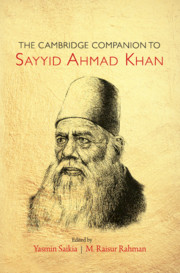Book contents
- Frontmatter
- Contents
- List of Figures
- Notes on Contributors
- Acknowledgements
- A Note on Spellings and Transliteration
- Chronology of Sayyid Ahmad Khan
- Introduction
- Part I Sayyid Ahmad Khan: The rise of a historical figure
- Part II Musalman-e Hind: Indian Muslim in a plural environment
- 5 Creating a Community: Sir Sayyid and His Contemporaries
- 6 Envisioning a Future: Sir Sayyid Ahmad's Mission of Education
- 7 Religion, Science, and the Coherence of Prophetic and Natural Revelation: Sayyid Ahmad Khan's Religious Writings
- 8 Defending the ‘Community’: Sir Sayyid's Concept of Qaum
- 9 Understanding Sir Sayyid's Political Thought
- Part III Sir Sayyid today: Enduring legacies
- Conclusion
- Suggested Further Readings
- Index
8 - Defending the ‘Community’: Sir Sayyid's Concept of Qaum
from Part II - Musalman-e Hind: Indian Muslim in a plural environment
Published online by Cambridge University Press: 26 April 2019
- Frontmatter
- Contents
- List of Figures
- Notes on Contributors
- Acknowledgements
- A Note on Spellings and Transliteration
- Chronology of Sayyid Ahmad Khan
- Introduction
- Part I Sayyid Ahmad Khan: The rise of a historical figure
- Part II Musalman-e Hind: Indian Muslim in a plural environment
- 5 Creating a Community: Sir Sayyid and His Contemporaries
- 6 Envisioning a Future: Sir Sayyid Ahmad's Mission of Education
- 7 Religion, Science, and the Coherence of Prophetic and Natural Revelation: Sayyid Ahmad Khan's Religious Writings
- 8 Defending the ‘Community’: Sir Sayyid's Concept of Qaum
- 9 Understanding Sir Sayyid's Political Thought
- Part III Sir Sayyid today: Enduring legacies
- Conclusion
- Suggested Further Readings
- Index
Summary
Sir Sayyid's long and adventurous life contained two or three ordinary lifetimes full of activity. In the larger societal arena, his beloved Muhammadan Anglo-Oriental College (1878) at Aligarh was his supreme achievement, but in other domains, he consistently saw himself, and was seen, as a mediator between the British and ‘native’ ideas and interests. Not surprisingly, his literary output was voluminous – he has left us records of his antiquarian interests (Ā ār-ul ṣanādīd, 1854 [1847]), his religious views (a commentary on the Qur'an), and his journalistic commitments (Tahżīb-ul a hlāq), along with numerous letters, essays, reviews, and speeches on a wide variety of topics.
Undoubtedly, the greatest watershed in his life was the Indian Rebellion of 1857. As an East India Company administrator posted in Bijnor, he was emphatically true to his salt, risking his life repeatedly in defense of British lives and interests. Then, in 1858, almost before the rebellion was over, he recorded his personal experiences and local impressions in ‘History of the Bijnor Rebellion’. However, the Bijnor account – as fascinating as it is – has always been obscured by his greater achievement during this intensely turbulent year: his famous work, really a sort of long pamphlet, called ‘The Causes of the Indian Revolt’ (Asbāb-e baġhāvat-e Hind).
In writing a work with such a title, at so fraught a time, Sir Sayyid knew that he was courting trouble. Still, he was determined. Once Sir Sayyid had gotten 500 copies of his Urdu pamphlet printed, the result was a dramatic scene:
When Sir Sayyid resolved to send them to Parliament and the Government of India, his friends forbade him. And Master Ramchandra's younger brother, Ra'e Shankar Das, who at that time was a clerk in Moradabad and was Sir Sayyid's extremely close friend, said to him, ‘Burn all these books, and don't by any means put your life in danger’. Sir Sayyid said, ‘To make clear all these matters to the government, I consider to be for the welfare of the country and the community (qaum) and the government itself; thus if it would be beneficial to the rulers and the people both, then even if some harm would come to me, that's acceptable’. When Ra'e Shankar Das saw Sir Sayyid's stubborn determination, and when no effect was achieved by his own persuasion, then tears came to his eyes and he fell silent.
- Type
- Chapter
- Information
- The Cambridge Companion to Sayyid Ahmad Khan , pp. 159 - 174Publisher: Cambridge University PressPrint publication year: 2019



